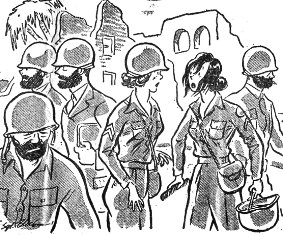
Vol. 1, No. 24 Published by India China Division, Air Transport Command June 28, 1945

|
Claimed Destroyed, City Ablaze Chungking, June 27 - Chinese forces are now reported to be fighting in the southern suburbs of Liuchow, the large Japanese base in Kwangsi province, and site of the former 14th Air Force field. According to unconfirmed reports arriving at the headquarters of the Chinese Combat Command, Chinese forces reached the Liuchow airfield several days ago and have been waging a fierce battle for the city. According to the same reports, Liuchow is burning and the airfield is destroyed. Support Driving down from the northwest along the Kweichow-Kwangsi railroad is a column of Chinese troops which are advancing to give support to the forces already battling in the immediate area of the town. This column was last placed at about six miles to the northwest. As the battle grows more compact and the Chinese push closer to the center of the town, the Japanese continue to resist stubbornly. It is apparent that the enemy realizes the importance of both Kweilin and Liuchow to the Allied strategy. A communiqu states that a fierce battle is raging near Yining, 30 miles northwest of Kweilin, where the Chinese inflicted heavy casualties and took some Japanese prisoners. Evacuation Between one and two thousand Japanese are fighting a delaying action at the Liuchow corridor through Kweilin to the rail junction city of Hengyang. The reoccupation of these bases which were evacuated last year (Kweilin, Sept. 14, 1944; Hengyang, June 22, 1944; Liuchow, Nov. 7, 1944) would constitute a serious threat to the Japanese-controlled railroad, considered by many to be the last avenue of retreat for the enemy. All through the week Japanese have been continuing to evacuate the Kweilin-Kwangsi area by water to Canton and the other Jap bases to the south. About 200 miles of the east China coastline, abandoned by the Japanese in recent fighting, is still partially protected from invasion by the strongly fortified island of Formosa, whose nearest point is 125 miles southeast of Foochow, the main seaport of Fukien province. Firebombing Chinese troops which took Foochow some time ago are still driving to the north, having pushed through Wenchow, seaport to the north of Foochow, in their drive aimed in the general direction of Shanghai. Fourteenth Air Force missions along the railroads north of the Yellow River netted 12 locomotives. Thunderbolts firebombed Japanese communication centers near Puchow in the Yellow River bend, and Mitchells hit bridges with good results. Chinese Air Force Sharks, supporting ground forces, bombed and strafed bivouacs, road traffic and ground troops, taking a heavy toll. Striking into French Indo-China, Mitchells and Mustangs destroyed three 200-foot steamers at Haiphong and probably sank another; hit troops and trucks at Fort Bayard with heavy enemy casualties, and broke the railroad bridge at Quang Tri and a highway bridge north of Tourane. |
|
If It's Hosses You Wish You Can Get 'em in Tibet
Hq., USF, Kunming, China - The first government animal pack train, led by two Americans, to come through the forbidden country of Tibet has arrived safely in Kunming after a 450-mile, 21-day trek. Flown to Tibet last April, Lt. Robert R. Forsyth, Northville, S.D., and Sgt. James Taylor, Kimball, Neb., were assigned the mission of transporting horses and mules, purchased for the Chinese Army, back to this base. Cross Mountains The trek started with 50 horses and 50 mules, the latter being packed and the horses being trailed. Lt. Forsyth and Sgt. Taylor were the only Americans with the pack train, the others being Chinese "ma-fus," or mule skinners. A Chinese interpreter accompanied the party. Never before traveled by Americans, the trail took the party up and down the tortuous 45-degree mountain slopes that are Tibet, across the angry, swirling Yangtze River which was swollen by the monsoons, and finally into the terraced lands of Yunnan province. Train Unmolested Most surprising incident of the journey, to the Americans, was learning that the Tibetans had never heard of Europe, nor had they any knowledge of the European war. Stranger yet, they did not know that China had been at war for the past eight years either. To safeguard the pack train from being attacked by bandits, a menace sometimes encountered in the northern regions, two Chinese flags were made and inscribed with the legend that the animals were the property of the Chinese Government. Though they passed several roving bands, the pack train was not molested during the entire trip. |
Under New
ATC Plan
Transfer Setup Between AAF BUs
Will Take Men to U.S.
Ed.-For too long following the fall of Europe, the ICD policy of returning its men to the States when their tour of duty was completed has been obscured. Whatever the reason, misinformation or lack of details, rumors have sprung up which have resulted in sour outlooks on the deal, disheartened those men waiting to leave, and caused a lowering of morale in general. To lighten these heavy hearts and to make it clear that men will go home, Hump Express runs the following article, written by a staff member after extensive research, in an effort to clarify the issue.
When Johnny comes marching home from ICD, it will not be on rotation. For, even though he is finally back in good old Uncle Sugar, he didn't rotate, he was transferred.
Foreseeing the problems which might arise, and realizing that its men must have the chance to get home after their tour of duty had been expended, ATC arranged with the War Department to establish a plan whereby men would go home. Throughout its worldwide divisions, ATC has many base units. And since these base units are considered to be like peas in a pod a suitable arrangement was made.
ATC's Individual Deal
Since a man can be transferred from a base unit in Georgia to a base unit in Texas, he can also be transferred from a base unit in Assam to a base unit back in the U.S. That plan is now in operation.
Therefore, while the WD has suspended rotation for tactical units, etc., ATC will continue to send its men home, by transfer.
After the fall of Hitler's Europe, military eyes turned, more than ever, to the Pacific and the war against the Japanese. It is a stupendous task, which will take all Allied personnel, equipment and material - this taking of the battle to Tokyo. As far as the United States is concerned, the task will get just that; anything that is needed to do the job will be put there, and in time.
To accomplish this, the WD suspended rotation and centered its efforts on the deal ahead. However, since ATC's men are scattered throughout the world, in all theaters, and since it has its own transportation facilities, it was decided to let ATC work out its own plan for sending men back to the States.
Transportation
ICD, being ATC's largest division, has the largest problems. It has run into two obstacles which have slowed up the process. The first is transportation.
Under redeployment plans the WD has requisitioned, or has assigned, a certain number of ICD planes to the job of getting personnel from tactical outfits started on the way home. This was done to expedite the movement of men through the U.S. to the Pacific; and since one of ATC's missions is the movement of troops and supplies to the theaters of operations, ICD came in for its share of the task.
This has resulted in reducing the number of planes, or seats, available to be used in transferring ICD men back to the better side of the world.
Replacements
In the matter of transportation by water, ICD cannot request that ships be sent to this area for the express purpose of taking men home. Only when a ship has docked in a local port to deliver cargo can arrangements be made to send some men home on the ship's return voyage. This problem calls for co-ordination with theater headquarters and a lot of waiting. This is so now more than ever, because the great portion of water transportation facilities are busy hauling supplies from the European Theater to the Pacific.
The second problem is obtaining replacements for the vacancies created by men transferred to U.S. bases. Operating under a strenuous schedule which is growing every day, ICD must have sufficient personnel to keep up with the increased tempo. Firmly convinced that its share in the Far Eastern war will play a large role in the victory, this division is reluctant to release men without replacements to take over and carry on.
Flight Crews
These replacements must come from the States; are apportioned by the War Department, the Air Forces, and theater decisions. These decisions form the basis for the quotas of replacements given to each organization. Only after these replacements are assigned to ICD can any definite efforts be made to hasten their journey to this theater.
Flight crews will be sent home under the same setup as they have had in the past - completion of 750 combat hours and a year's tour of duty overseas. They will have little or no delay in obtaining transportation.
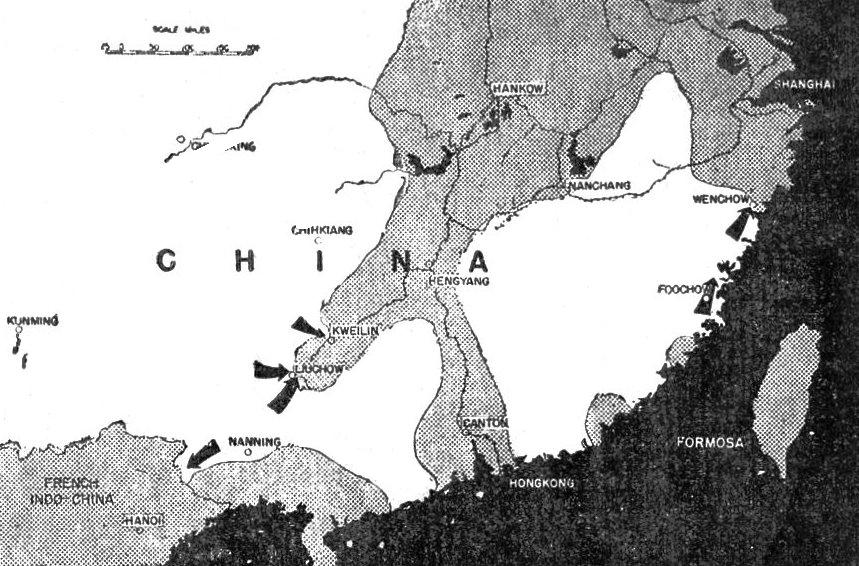
|
Sport of Kings, Etc., Demands Proper Garb
1350 BU, Kunming - Cpl. John Tallon, Brooklyn, N.Y., a veteran of the African and Italian campaigns, is telling one that doesn't set so well with the legal minds.
Guests at a Cairo hotel were awakened one night by a wild screaming in the corridor and discovered a beautiful gal in scant negligee fleeing madly from a man who was, to put it bluntly, peeled. The next day it developed that the impetuous Romeo was an English major. He was promptly court-martialed.
His lawyer won his acquittal by virtue of the following paragraph in the army manual: "It is not compulsory for an officer to wear a uniform at all times, as long as he is suitably garbed for the sport in which he is engaged."
Naga Chief Gives Latest Malum About 'Airchines'
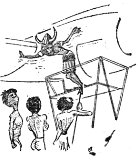
|
1330 BU, Jorhat, Assam, India - Few GIs who saw it will forget the spectacle of an orientation lecture on airplanes by a Naga chief who recently visited this base.
Chief Karili Chang Ao (the Nagas pronounce it something like Carlie John-Oh) had been hospitable and helpful to a group sent up from 1330 into the hills to prospect for lumber. In return for his aid he was invited to visit the home of the "giant noisemakers" which roar over his domain from time to time. To the general surprise, he accepted, and came down for a visit bringing a party of four, two being interpreters.
To thus who hadn't seen the chief before, his raiment came as quite a shock. He wore a scarlet cloak draped over one naked shoulder, wild boar tusks around his neck, two ivory bracelets about an inch and a half thick around his upper arms, assorted bracelets on his wrists, and a rectangular beaded affair in the manner of a "G-string."
The chief was taken to the Butler hangar and shown some of the Hump-hoppers. First, to convey that he understood, he made circular motions with his hands and jumped up and down. Then, increasingly impressed by the size and noise of the big ships, he mounted a crew chief stand and delivered an animated speech, with gestures, giving his men the lowdown on the situation.
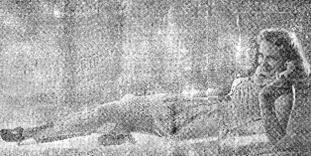 Here's the white phone with no wire again - Elaine Shepard "calling" this time. Another interesting prop, too -
looks like a mammoth overstuffed love seat. As Goldwyn said when he saw the sundial, what won't they think of next?
Here's the white phone with no wire again - Elaine Shepard "calling" this time. Another interesting prop, too -
looks like a mammoth overstuffed love seat. As Goldwyn said when he saw the sundial, what won't they think of next?
|
First ATC WACs
Assigned to ICD
Arrive at Karachi
1306 BU, Karachi - The first shipment of WACs assigned to ICD has arrived at this base via C-54, after a four-day trip from LaGuardia Field, New York.
The grapevine was working well Saturday night and by the time the first plane-load of 22 had reached the field a sizeable delegation of GIs was on hand at the terminal to greet them.
To M/Sgt. Pat Chadwick, Yonkers, N.Y., fell the honor of the first date - with Pvt. Pat James, New York City. On Sunday the WACs first full day in India, the new arrivals were treated to a beach party by the Red Cross.
A total of 48 had arrived by Monday night. A majority of the women will be stationed at Karachi and a number will be assigned to ICD Hq., Calcutta. All of them were in the Ferrying Division of ATC prior to volunteering for overseas service.
The Mortification of H*y*m*a*n K*a*p*l*a*n
1357 BU, Burma - T/Sgt. Hyman F. Kaplan, special service foreman, was hard at work at one thing and another when he found himself clapped on the shoulder and asked, "what about this dramatic club I hear about?"
"Beats me, bub" The temperature dropped abruptly.
"I see by the bulletin board," continued the persistent information seeker, "that special service is the place to get the dope."
"See Walpert," said Kaplan, not pausing in his work. "He's the guy that handles that stuff."
"Where's Walpert?" pursued the dogged one.
"He's not around just now. Why don't you leave your name and squadron number so he can get in touch with you?"
So he did. The squadron was part of an SOS detachment nearby, and the ambitious thespian was Spanky MacFarland, one-time ring-leader in mad pranks of "Our Gang," Hal Roach comedy shorts of - you figure out how long ago.
Evidence Shows Japs Are Ruthless to Own Wounded
Manila (ANS) - Bodies of 125 Jap soldiers, bayoneted or shot by their comrades as they lay in bed, have been discovered in an abandoned enemy field hospital on northern Luzon, General MacArthur's headquarters announced.
Photogs Get Pix
Even before American troops had made the gruesome discovery, evidence had been accumulated that Japanese ordered ruthless extermination of their wounded. The Japs had withdrawn before the hospital could be set ablaze, permitting Army Signal Corps photographers to make a record of the appalling scene of death.
Headquarters also released extracts from Japanese documents and statements by prisoners captured by Americans citing the enemy's attitude toward his own sick and wounded. A spokesman added: "This is the best evidence we can glean to prove the Japanese slaughter their wounded."
One order of a commanding officer of a Jap armored regiment read: "Men who are slightly wounded will participate in this battle. When wounded men are not able to participate in battle their unit leaders will see to it that they end their lives."
A Jap naval lieutenant from Bataan said, under questioning, that he was ordered by Commander Sato "to tell all patients to prepare to die honorably" after the situation became hopeless on the peninsula.
Dynamite Used
"He returned to the hospital," a transcript of the questions continued, "assembled the remaining medical aides from the other hospitals, and told them of Commander Sato's orders.
"Those patients who were able and wanted to die were given hand grenades and pistols. One prisoner of war admitted he killed two patients with a sword. The remainder who could not do it themselves were killed by dynamiting the entrance to each ward in such a way that the explosives caused a landslide to cave it in."
A MacArthur spokesman said: "We want Americans to know what kind of cruel, inhuman soldier we are up against."
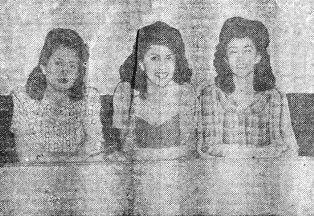 The three Farmer sisters have made transient service a family affair at 1303 BU, Agra, where (left to right) Dot, Wyn
and Pat have taken over the information desk. Though they now work in the rushed environment of the busy passenger
terminal the sister trio until recently led a secluded life in St. Ann's convent in Hyderabad state.
The three Farmer sisters have made transient service a family affair at 1303 BU, Agra, where (left to right) Dot, Wyn
and Pat have taken over the information desk. Though they now work in the rushed environment of the busy passenger
terminal the sister trio until recently led a secluded life in St. Ann's convent in Hyderabad state.
|
New Rest Camp Offers Breakfast in Bed, Too
1308 BU, Bombay - Breakfast in bed and all the rest of the trimmings are the boast of a new "luxury rest camp" being opened here July 1. Located at the Deepak Mahal hotel and staffed by two officers, six EM and 120 civilians, the camp will accommodate personnel on leave from their posts at India wing bases.
Increase in Traffic Prevents Some Mail from Going by Air
Hq., Calcutta - In response to requests for information from bases, division postal authorities recently revealed that considerable parcel post is being dispatched by water from Calcutta, because of increased States-bound air traffic.
Postal officers said parcel post, including that for which postage has been paid at the first class rate, as well as a regular fourth class package, is sent to the States by air on a "space available basis," but pointed out it may be off-loaded en route and forwarded by surface craft.
In short, it was explained, paying first class rates gives no guarantee that package mail will travel "home" by plane.
CHINA This Week
by Dwight Coolie
SUPER SAMPANS...
It is reported that the great, the stupendous, the vesselating Henry Kaiser is in close co-operation with certain interests which are concerned with operating a giant shipyard in China after the war. Building the latest thing in junks, no doubt.
Kaiser also is reported to have an eye on the proposed Ichang flood-gate scheme.
Damn busy man, huh?
TO THE BOYS...
Chinese have proved that in some ways they are ahead of the rest of the world, and it might be well for some of the peace termites at San Francisco to perk up their ears.
A recent issue of a rice-paper rag says "-the glory is on the battlefield and in the countryside and not in the assembly hall or the secret chamber."
It is apparent that Confucius has many followers. Some wise men were lucky that way; too bad Wilson wasn't.
WILLOW CITY
Once Liuchow, the willow city, was a beautiful little town.
Today it is a city of death and devastation.
Her quiet ways, her peaceful streets and enjoyable tea-rooms where men and women once walked in the cool evenings or chatted during the languor of an afternoon, now reek with the stench of death.
Once Liuchow was as quiet as the green waters of the river Liu which divides the town into two parts. It was a place for idle talk and calm living. But no more. All those pleasantries went with the coming of the Japanese.
The shaded walks along the river banks, the gayeties of swimming pools, modern buildings and shops where GIs spent their spare hours, are buried under the dust and rubble of war. It is a ghost of other times, a picture of destruction.
Shredded sprouts from the shattered willow limbs float along with debris on the cluttered waters of the river, ruined buildings are tangled with weeds, and grass grows through cracks in crumpled walls. In seven months as it is to every town, war has been harsh to Liuchow.
But after the seven long months of occupation Liuchow is going back to its own people. Perhaps some day the bomb craters will be filled, the buildings will be rebuilt, and the waters of the river Liu will flow calmly along the willowed shores.
BATTING AVERAGE...
Several weeks ago "China This Week" came out with a prediction. We said we thought the Japs would withdraw to the north, leaving areas to the south with little defense, since those regions were not well fortified. We also prophesied last-stand fighting in Manchuria.
Things are still looking that way as the Chinese continue to push through the enemy lines. Gradually they are turning to face the North star. A few days ago United Press came out with a prediction right in line with ours. This makes us feel good but not quite good enough to start saying "we told you so."
Perhaps we're too busy looking at that star to the north. it's a little difficult to decide just what color it is.
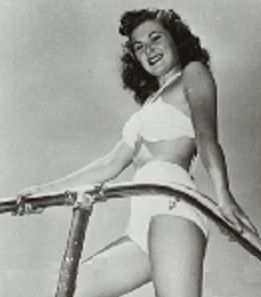 It says this is Barbara Hale "NOT dressed for her part as an Army nurse in 'First Man into Tokyo'." That's all
right, don't fret about it.
It says this is Barbara Hale "NOT dressed for her part as an Army nurse in 'First Man into Tokyo'." That's all
right, don't fret about it.
|
Activity, Not Sack, Plays Important Role
In Making Men Well at Kunming Camp
'Work Therapy' Takes Place of Confinement While GIs are Kept Busy
At Newly Established Convalescent Camp on Yunnan Lake
Kunming - A convalescent camp has been established outside Kunming on the route of the historic Burma Road.
The site of the camp is located at the country home of a Chinese general and fills the grounds of a palatial mansion in one of the most exclusive districts of the Kunming area. The camp fronts on a portion of Yunnan Lake and in the background the hanging temples of Hsi Shan (West Mountain) add to the beauty of the surroundings.
Using the technique of "work therapy," the hospital is not just a rest camp but a place to get into shape, physically and mentally. Most of the improvements around the location have been made by the patients, who work at jobs of their own choice. These men are kept busy most of the time, mainly because they want it that way. Colonels take calisthenics and work with privates; there is no distinction among the patients.
To prevent boredom, bicycle rides and hikes are scheduled. Educational tours are taken to places like the local cotton mill or a research laboratory located in the area. Activities at the camp are not all physical. Each morning a definite period is set aside for discussions.
Typical comment by a trainee who was in the camp for only five days was made by Pvt. Albert W. McKenzie, Chicago, Ill. "I feel better after only five days here than I ever did in four weeks in the hospital." Another said it was the first time he had been able to relax physically and mentally since joining the Army.
Hidden talents have been discovered among the men as they putter around in the craft shop making things with their hands or work in the camp garden. It gives them a chance to satisfy the hankerings for little pleasures they left behind upon coming overseas.
Sharp Isn't So Sharp As He Gets the Bill !
1339 BU, Chengkung, China - From all reports, Cpl. Robert L. Sharp, Elgin, Ill., duty NCO of this base, is a go-getter. In this case he turned out to be a go-getter of the Sad Sack variety.
It seems that Sharp, seeing the poor condition of the area around the barracks, decided it was time for action. He proceeded to round up a suitable number of coolies to do the job, shanghai-ing them any place he happened to run across a few.
The coolies did a fine job, filled in holes and generally made the area presentable.
Sharp then patted them on the back for a job well done and dismissed them, but the coolies weren't going to be dismissed so easily. They began clamoring and raising a h--- of a stink. They practically mobbed the boy.
The duty NCO didn't get away until he had been presented with a bill for something like $17,000 CN.
Flight Lunch Now Used by Humpsters to Cut Turnaround
1333 BU, Chabua, Assam, India - The mad dash to a transient mess hall in China for "flied eggus" is a thing of the past for crew members here flying the Hump, as a result of a new box lunch distributed to crew members prior to takeoff.
Although box lunches are nothing new to those who flew other ATC routes, their initiation on the Hump route marks their introduction to ICD. Each box, prepared "on the spot," includes three assorted sandwiches, cookies, candy, pickles, and a cup for beverages. Each crew also receives two thermos jugs, one with coffee and one with fruit juice.
The lunches are prepared 24 hours a day at the operational snack bar, to assure freshness. The project was under the supervision of Capt. Frank Van Patten, assistant ICD mess officer, responsible for introducing the box lunch to the Central African Division. He is the former proprietor of the Van Patten restaurant, Los Angeles.
In addition to cutting down turnaround time, the box lunch enables the crew members to remain in the ship at all times. They eat while the cargo is being unloaded and the plane serviced and are ready to take off for the return trip at a moment's notice. It is estimated that this system will save time enough for at least ten additional trips per day.
Although still in the experimental stage, the box lunches won the approval of flight crews and it is believed they will be used at other ICD bases in the near future.
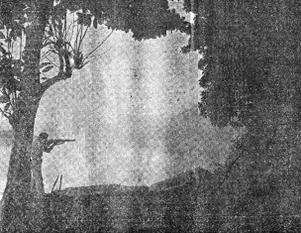 1327 BU, Tezpur, Assam, India - Framed in a setting of jungle foliage, a flyer finds good sport shooting ducks in the
early hours of the morning. Here is a camp on the banks of the cold watered Borelli River where Hump-weary flyers
find relaxation and rest.
1327 BU, Tezpur, Assam, India - Framed in a setting of jungle foliage, a flyer finds good sport shooting ducks in the
early hours of the morning. Here is a camp on the banks of the cold watered Borelli River where Hump-weary flyers
find relaxation and rest.
|
Nay More Gazelle Steak Dinners When Monsoon Ends Hunts
1349 BU, Jiwani, India - Gazelle abound in plains and foothills not far from this base. Until recently chops and steaks from these high-speed creatures made a welcome addition to the mess menu.
It is feared, however, that the hunts will be curtailed for the period of the monsoons (signaled here by an increase in relative humidity). A recent party arrived at a crossing in the river bed where the dust has been hub deep for about 11 months to find the water flowing exactly like the Brahmaputra and quite as deep.
So far no ingenious GI has found a way to cross except by boat and there aren't any boats, nor any lumber with which to build one.
Heavy thunderstorms a hundred miles away are the cause of this phenomenon, and the 1349th continues as dry as ever.
Fifty Grand - CN - Is Nuthin' at All
1342 BU, Chanyi, China - When fire destroyed the modest home of an elderly Chinese couple living near the ATC hostel here, American who saw the ravage of the fire were touched by the plight of the family and a voluntary collection was begun.
A fund of $51,900 CN was collected from officers and enlisted men of this base. This sum was presented to the couple by T/Sgt. James D. Brick, first sergeant of Squadron A.
ETO Has Mud, Slush, Goo, But CBI Has Its Share Too
Trucks and Wagons Stick, Find India's Stuff Is Thick
1345 BU, Kurmitola, India - Newsreel scenes of the western front depicting hopelessly mired trucks draw no more than a slight eyebrow lifting among the truck drivers here.
From May until October, the truck drivers insist, the entire area is a sea of mud - red, sticky mud.
To illustrate their point they cite the incident caused by a mired ambulance.
When the croaker's car bogged down they appealed to the motor pool for help. In quick response a six by six was dispatched to the aid of the medics. The big truck hooked up its winch and slowly drew the ambulance to it. Then, with the air of trouble-shooters who never fail, they prepared to leave. They were noticeably annoyed when the wheels went round and round but came out nowhere.
A hurried call brought another six by six, destined for the same fate. After three vehicles were stuck, frenzied calls went out for all sorts of rescue equipment. By the time a wrecker truck with a massive crane reached the spot, the motor pool had despaired of ever functioning again this summer.
When the six by sixes had been cleared away the ambulance was towed out and the medics went about their business. The motor pool boys went back to the parking lot - and stayed there.
 To The Queen...
To The Queen...
We feel that it is fitting to take time off from our petty squabbles, our moans and groans, to pay tribute to the infantrymen in the Army of the United States.
This might be considered a belated observance of Infantry day (June 15) which was set aside to honor those men who have crawled through mud and over mines, stormed beach-heads and captured bastions to make possible the victory in Europe, the future victory against Japan.
There is no easy street in the war, but if there is a road that seems harder than the others, it belongs to the doughboys.
To the doughs, the men of the infantry - Queen of Battle - we humbly say, "well done, damn well done."
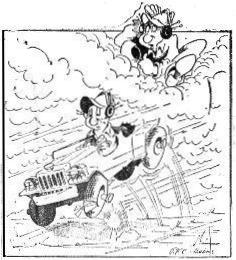 "Ceiling zero, altitude 10,000 feet."
"Ceiling zero, altitude 10,000 feet."
|
Last week we tried to present to you a fairly clear picture of the rotation set-up in this division.
Because of our rather feeble attempts, the big-dogs have come out with an announcement which has semblance of reality, some definite line of attack and something which, at last, helps to clear the picture.
It seems that ATC, since it has men scattered all over the world and over hell's half acres (ICD), has a rotation plan of its own. ATC is not covered by the War Department directive which announces the suspension of rotation - because its system is technically a transfer system.
ATC, and ICD, will continue to send men home.
They will go home as soon after their two years is up as is possible. That doesn't mean a year later, six months later, or when they make up their minds to straggle around to cutting the orders.
It gives us a good feeling to be able to tell this to you guys out there. You men have worked hard and sweated a long time for the privilege to go home. You're going home. Here's how, when and why.
Ground personnel who have been here for 24 months will be sent back to Uncle Sugar. They may be late in getting started, but they are going home!
Air crew personnel who have completed both their 750 hours combat time (over the Rockpile, in China, etc.) and their one year tour will go home. They will have little or no wait before leaving.
The whole system operates like this:
When a man is ready to go and there is a place in the quota for him, ICD will institute an administrative transfer.
This transfer, which is just a technical way of rotating a man back home, will relieve him from duty at his AAF BU in ICD and give him a PCS to the AAF BU nearest his hometown. In other words it's exactly the same thing as being transferred from Kunming to Calcutta of from Delhi to Assam. It's just a transfer, a permanent change of station.
But it gets you home, and who cares how you get home, just so you get there?
Therefore, let there be no more moaning at the bar or sniffling at the chaplain's door. You will go home when your time is up.
Rotation, under a new name, is still in effect for ICD.
Teek hai, ding how, hot dog, yeah... and all that stuff.
Which leaves us with a satisfied gleam in our eye and a good feeling in our mind. For even though we did provoke great misgivings and get chewed out all over the place, we have finally dug up that information which you men have been yelling for during the past months. And that's our job, to give you guys what you want (Exclusive of blondes, beer and bubble-bath.)
It also leaves us with the hope that henceforth, when we seek information for the benefit of the guys out in the field we'll be given the real stuff for we print the information we receive. When it is given to us incomplete or incorrect, what can we do?

'Pampered' One
Editor:
This is an answer, perhaps feeble, to nine groundlings who wrote last week that flying personnel are pampered.
I feel I am writing this not only for myself but for hundreds who have given their lives.
These nine are peeved that flying personnel "rotate" in a year or maybe 18 months. May I ask how often they have looked out as rain made ceiling and visibility zero and muttered (or thought) "Gee, I'm glad I'm not flying tonight" - perhaps overlooking the fact that some were flying at that moment, calling on God to keep those engines going as the ice piled up on the wings? (Yes, I said calling on God; that isn't just something the chaplain made up.)
Menon the ground make it possible for planes to fly, no doubt of that. I'll agree that long months of monotonous work get a guy down and that after 24 months he's more than ready to go home.
|
Take the star down, Mother; I've news that won't keep; I'm fighting the war here by driving a jeep. Hauling the crew members up for their chow, Gathering dust on my beaten brow. It's the AO's lament, so sad but so true, I'm doing what anybody else could do. I don't mind so much driving all the rough miles, But it's given me China's worst case of the piles. Rotation? The word has no meaning to me. I'll finish my flight time 2000 A.D. And at the war's end when I'm home with my kid And Junior asks what his old father did - With very sad eyes, I'll probably weep To tell him I spent the war driving a jeep.
Second Lieutenant
|
But I am firm in the belief that after 750 hours over the Hump a man is close to the edge. The reprieve called rotation often saves a man's life - and those of his crew.
Pampered? Not so much.
- A Pampered Pilot, 1333 BU, (Chabua, India)
P.S. There are different kinds of piloting, too. I'm talking about the Hump.
Throws Eggs At Us
Editor:
So the men at 1347 are eating all the fried eggs they want every other day. That was certainly news to me. Perhaps you would be kind enough to tell me which mess is serving them. I eat at the EM mess...
- Pfc. R. H. Miller, 1347 BU (Shamshernagar, India)
Rotation Merry-Go-Round
Editor:
Is the ATC releasing men with long periods of service? (They are doing it in the ETO - even in the Air Forces). If not, when do they intend to send us back?
- Pfc. Pasquale Brignolo, 1344 BU (Hsinching, China)
Editor:
What about rotation? Everyone is in a quandary.
This is a beautiful war for generals down to captains, as they are reaping more money than they ever made in their lives. We poor GIs have to suffer...
Point system for officers? Why, that sounds foolish. About 25 percent of them want . . discharge. "Jungle ration," longevity, subsistence, easy jobs - with NCOs doing all the work (or is the private doing the work?)...
Give a soldier a chance to go home and earn an honest dollar and see what it is to be a civilian instead of working with a lot of rank-happy officers...
- Pfc. Jim Halperin, 1342 BU (Chanyi, China)
Forgotten Men
Editor:
We have read in recent issues where a number of actors and actresses have toured this theater, and have entertained thousands of boys. Why haven't they been to 1347 - or don't they know where it is? We have had two in six months. We ain't seen nuthin'.
- Sgt. H. Shepherd and six others, 1347 BU (Shamshernagar, India)
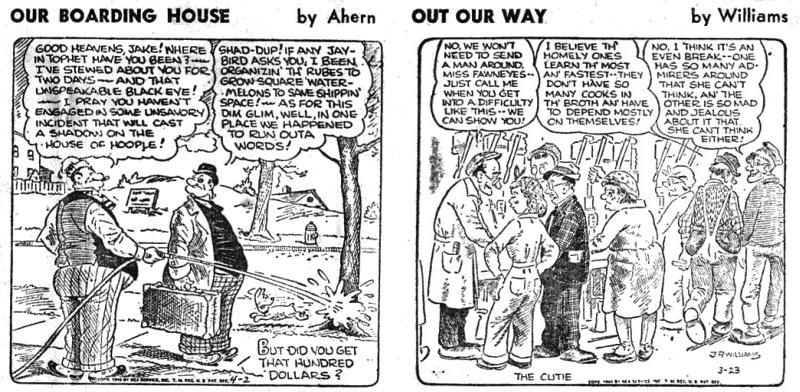
|
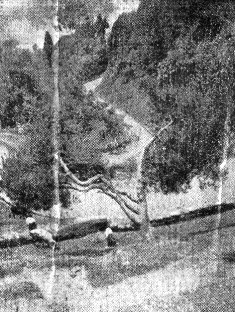 Looking down from Jalapahar to where the Ghoom-Darjeeling motor road forms a narrow, curving shelf along the mountainside.
Looking down from Jalapahar to where the Ghoom-Darjeeling motor road forms a narrow, curving shelf along the mountainside.
|
By S/Sgt. Gordon R. Lewis
To some a session at the Army's rest camp at Darjeeling means just what it says - a rest. To others it means a couple weeks of freedom from 'most everything military. But to all, it can be an event.
The event starts when the GI steps off the full-sized train at Siliguri and boards the pocket-size version to begin the long haul up and around the mountains.
Some shake their heads in disbelief that the little locomotive, made in Glasgow about the turn of the century and standing little higher than an average man, actually can chug up the mountain with its tail of three or four packed coaches.
Rain Is Plentiful
As the Lilliputian engine puffs its way upward, stopping for water it seems every few miles, the traveler settles back, first to enjoy the beautiful scenery, then to study the hillfolk and, long before reaching the destination, to be a bit bored, and sore about the bottom, from sitting six or seven hours on wooden seats.
Arrival at Ghoom (nicknamed "Gloom" by the permanent party men because they nearly always pick up the vacationers in a downpour) has most of the aspects of arrival at a reception center. Men and luggage are trundled off in a rough-riding truck, over tortuously rough and winding roads, to camp, a couple of miles up the side of the mountains. The lower camp is at Jalapahar and the upper, at Katapahar.
Even the rain and the "reception center" first impression can't dampen a man's enthusiasm. He's away from
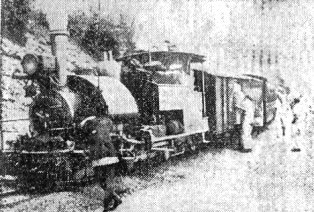 On this tiny train, men on rest leave journey up the mountains to the camp near Darjeeling. The locomotive was made
in Scotland many years ago.
On this tiny train, men on rest leave journey up the mountains to the camp near Darjeeling. The locomotive was made
in Scotland many years ago.
|
Club Run by Civilians
Many spend their first half hour at the camp looking for showers. There aren't any. The more hardy hop into a galvanized metal tub and holler for the panee-wallah to bring a couple of pails of rain water, warmed over a wood fire.
Lack of showers at the camp leads some "veterans" of two days to say: "Say you want to join the Bagmari club tomorrow. Fine clubhouse and hot showers. Billiards, reading and writing rooms, bar, flush toilets, everything. Good meals, too. It costs Rs. 2/8 to join for a week or Rs. 5 for the time your here . . ." Almost all of the GIs become members of the club, run by civilians, endorsed by the Army.
The dawning of the first full day at camp customarily takes men down to Darjeeling (900 feet by plumb-bob and one and a half miles by foot below Jalapahar) in quest of a hotel room - which usually is as hard to find as showers at camp. A vain up and down hill trek (everything is either up or down hill) to the leading hotels usually is enough to dampen one's interest in a hotel room. Some, however, are lucky enough to hit the right spot at the right time.
By the second or third day, those who have been stuck in a barracks with 29 other GIs become wise enough to keep their eyes open for the separate rooms housing only three men and affording the relative comforts of a hunting lodge - peace, quiet, shelf space, charpoys and a fireplace. The fireside and the reminiscences it conjures up are worth the trip to the mountains.
Once in a "private" room, most men are content to stay at camp.
Restaurants Mostly Chinese
The municipality of Darjeeling offers little except the ubiquitous ponies which solve the hiking problem (but offer no solution for the painful sitting problem) and curio stands and stores which charge even more than some of Calcutta's marts and have little added attraction other than Nepalese and Tibetan doo-dads.
Most of the city's restaurants, operated mainly by Chinese, serve fair meals, but most rest-leavers seem to prefer to save the dough for pony riding or something else and eat at the Army mess.
The event of the leave is usually a trip to Tiger hill. Smarter boys take horses or taxies. The writer, however, at the insistence of a couple characters who don't like ponies, was forced out of bed at 3:30 a.m. for a HIKE up the hill starting at 4 a.m.
Among those who made the trek were S/Sgt. Joe V. Powers, San Antonio, and S/Sgt. Sam Leff, Chicago, both of the 1300 BU, and S/Sgt. Anthony Sliwka, Wyandotte, Mich., and Sgt. William C. Lawton, Milwaukee, both of the 1305 BU.
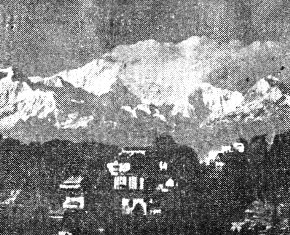 Nearby town and distant mountain peaks merge in a panorama which seems to bring the snow-covered peaks deceptively
close.
Nearby town and distant mountain peaks merge in a panorama which seems to bring the snow-covered peaks deceptively
close.
|
The hikers began the walk in beautiful weather, under a bright moon, chasing a prowling jackal into the woods and enjoying the prospect of seeing Mt. Everest, the highest peak in the world in the sunrise. The books say Everest, towering at 29,000-odd-feet, and located 100 miles away, can be seen from Tiger hill through a dip in the mountain range.
Seven-mile Hike
Up, up the hikers puffed. At 5:15 the dawn began to filter through the thinning timber on the mountainside as the clouds lifted a bit and quit dropping moisture which condensed and fell from the trees like rain. The mountain leveled off and the five breathed more easily as it appeared the climb was finished.
The last 15 minutes of walking, however, was a 45-degree ascent from the spot where the motorists had parked their cars. It seemed as if the hikers never would reach the summit, but the sight of hoof tracks and other marks left by the horses which carried the smarter folks to the top spurred the party on.
When the GIs' breath was gone and their charley horses had become stubborn, they rounded a curve which brought them in view of the observation tower already cluttered with people at 5:30 a.m., just as the sun peaked through the clouds. It was bitter cold and damp enough to make the five sweating hikers bundle up with field jackets and raincoats in a vain effort to keep out the early morning chill.
The foot-borne were really proud as they viewed the "softies" who horsebacked or motored up. They were proud of the seven-mile hike in which they climbed 1,300 feet.
They were proud - until a group of missionaries, including an American woman who had spent 60 years in India and who must have been 70, arrived, looking as if they were ready to go a few, fast games of handball.
After an hour on the chilly mountaintop, the spectators decided they weren't going to see Everest that day because of the clouds. In fact the missionaries reported that the peak hardly ever is seen this time of year. Some GIs were rather disgusted after their third or fourth useless rides to the hilltop.
Some Interesting Sights
A trip to Keventer's dairy farm, which lies between Ghoom and Tiger hill and usually is visited on the hill trip, gives the travelers a look at a U.S.-type farm layout. The farm supplies fresh milk and butter to the Army mess.
The hikers were content to retire to the barracks and gaze out of the window at Kanchenjunga on subsequent mornings. Kanchenjunga, reputedly the world's second highest peak, is 28,142 feet up and only 45 miles away from camp. It is visible on a clear day, its snow-capped peak poking its head into the blue sky above the clouds.
For sightseers, there are plenty of side trips (horseback recommended even for those who don't like horses), Victoria falls, for instance, is supposed to be a beauty spot, when the water is falling. The Buddhist monastery at Ghoom offers an interesting sight, with a bonafide lama and Buddhist tablets to inspect. Another monastery near camp is less commercialized. Other temples, usually gold-domed and marked by dozens of "prayer flags" on poles dot the hills of the area.
For those with a yen for the more worldly, the race course at Lebong, at the far end of the city, holds some fascination, although the season is limited. There also is roller skating (at the Gymkhana club); dancing at hotels and clubs; tennis, baseball, soccer and miniature golf at camp and "full-size" golf at Lebong (if one is a mountain goat) to take one's mind off "rest" when time hangs heavy on one's hands. Movies are shown at camp and at a theater in Darjeeling, but most of the pictures have been seen at Army bases months before they appear at Jalapahar.
For the guy who wants to rough it and/or rest, the camp at Jalapahar is a good deal - if he doesn't mind going up or down every time he moves ten feet and if he doesn't mind doing it in a drizzle or rain.
 Only the rugged go to Tiger Hill for a glimpse of Everest, and only at certain seasons, and spasmodically, is it
visible. But the grand sweep of the Kanchenjunga range, above, is the constant neighbor of the camp - or so it
seems, though Kanchenjunga itself (highest peak at right) is 45 miles away. Height: 28,142 feet.
Only the rugged go to Tiger Hill for a glimpse of Everest, and only at certain seasons, and spasmodically, is it
visible. But the grand sweep of the Kanchenjunga range, above, is the constant neighbor of the camp - or so it
seems, though Kanchenjunga itself (highest peak at right) is 45 miles away. Height: 28,142 feet.
|
Mandatory Rest System For Air Crew Members
Hq., Calcutta - A new system for leave, rest camp and jungle indoctrination has been established which will be a mandatory schedule for all air crew members.
The program provides approximately 60 days leave during one year of foreign service and gives flying personnel ten months in which to complete the required 750 hours in the air.
Starting with a three day period at jungle indoctrination camp immediately upon arrival at an assigned base, the leave schedule authorizes a seven day rest period at Shillong, when air crews have completed 200, 300, 500 and 600 flying hours. Fifteen days temporary duty at a U.S. rest camp or the Shillong recuperation center will be taken upon completion of the total flying hours.
It is felt that the program will promote flying safety and give the fliers a chance to relax between allotted periods of flying. Additional leave may be granted by the base CO upon the recommendation of flight surgeons to men who feel the need of getting away from it all.
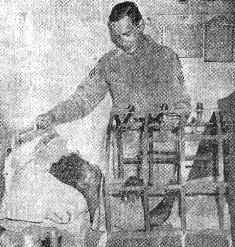 R. Duraswama, Indian motor mechanic, thanks Sgt. Leonard Rosenberg for saving his life. Duraswama's clothes
caught fire when he kicked over a container of gasoline in the motor repair shop. Sparks from a nearby tug ignited
the petrol and flames spread rapidly over the Indian's clothes. Sgt. Rosenberg tore the burning clothes from the
man and rolled him in the dirt to extinguish the flames on his body.
R. Duraswama, Indian motor mechanic, thanks Sgt. Leonard Rosenberg for saving his life. Duraswama's clothes
caught fire when he kicked over a container of gasoline in the motor repair shop. Sparks from a nearby tug ignited
the petrol and flames spread rapidly over the Indian's clothes. Sgt. Rosenberg tore the burning clothes from the
man and rolled him in the dirt to extinguish the flames on his body.
|
Heroes Save Day in Blaze
At Bangalore Repair Shop
Rosenberg Rescues Indian from Probable Death
As Godek Removes Gas-Loaded Truck from Path of Flames
1309 BU, Bangalore, India - The quiet of the Indian afternoon was shattered by the cry of "fire!" Flames leapt out of the engine housing of a tug and quickly spread to the other parts of the motor repair shop. An Indian motor mechanic, his clothing a burning mass, ran hysterically across the field toward a group of parked aircraft.
Sgt. Leonard Rosenberg, Passaic, New Jersey, was at his desk in the engineering tent when he heard the screams of the pain-crazed India. he dashed from the tent, caught the human torch, threw him to the ground and tore the burning clothes from the man's body with his bare hands. Then he rolled him in the dirt to extinguish the flames on his body.
Prevents Explosion
In the meantime, in the machine repair shop, GIs and civilians were fighting the fire. An F-3 refueling truck, loaded with 750 gallons of high octane gasoline, was parked in the shop and the flames had spread to the wheels.
Someone shouted, "Run before that truck blows up!" and T/Sgt. Joseph Godek, Wilkes Barre, Pa., started running - not away from the flame-encircled truck, but toward it. Leaping into the cab, he drove the death-laden truck out of the hangar.
Lives Saved
Investigation disclosed that the fire was started when an Indian mechanic accidentally kicked over a can of gasoline which splashed into the engine housing of a tug undergoing a generator cleaning and checking. Sparks from the generator ignited the gasoline, and the flames spread to the gasoline-soaked clothing of the Indian, who was doggedly standing by.
The base surgeon reported the timely action of Sgt. Rosenberg undoubtedly saved the burned mechanic's life. T/Sgt. Godek's actions not only saved the lives of some 15 men fighting the fire, but also untold damage to government property and equipment.
To the Officers and Enlisted Men of ICD:
Recently there has been an enormous amount of wild rumor and misinformation about rotation. Here are the straight facts.
The rules for eligibility for rotation, and note that word eligibility, are unchanged.
Air crew rotation will continue and men may anticipate that they will move reasonably soon after they become eligible.
Most of the confusion exists with regard to ground officers and men. The balance of this letter will be devoted to the question of their status.
Those who became eligible after March 30, in April, and in May, may expect to return to the United States in the latter part of August or the first part of September. Your return is dependent upon the arrival of replacements, getting the replacements to your station, and securing transport for you.
Those of you who became eligible for rotation in June have been reported and your replacements have been set up on a quota, but we do not know exactly when those replacements will arrive. We anticipate that you are to be returned shortly after those who are due in April and May.
Replacement quotas have been requested for enlisted men who departed the United States prior to July 26, 1943, and for officers who departed prior to July 1, 1943. These men may anticipate that their replacements will be set up on a quota and shipped and they will receive definite information as soon as we can get the estimated time of their departure.
For those men who will become eligible after July 26 the ATC has placed a suspension on their being reported for rotation, but our information is that this is a temporary suspension and the ATC has directly informed us that they will authorize this division to submit further rosters in sufficient time for replacement shipments to be prepared. We have no reason to anticipate that this suspension will be permanent. When this suspension is lifted you will be told.
The ATC in Washington is kept constantly informed as to the status of our rotation situation. We do this many months in advance by numbers and MOS. We report shortly in advance accurately what the eligibility will be. The ATC, in turn, sets up filler replacements, by quotas, which they endeavor to make by months. As far as they are physically able to do it, they try to ship quotas in the month that the people intended to replace would become eligible. Because of the transport situation, this is not possible at this time and probably will not be possible for several months to come.
Up until the time of V-E Day, rotation in the ICD worked reasonably well, certainly as well as any other unit in this theater. Since V-E Day we all know that our Army is in the process of redeployment against Japan. The War Department is making certain that it is handling enough men and material to win the Japanese war as speedily as possible before they give ATC space to ship quotas to this theater to replace unwounded men. It is obvious that the faster this redeployment can be accomplished, the sooner the war can be over and the more American lives can be saved. Nobody can object to that policy.
So many men are now becoming eligible in the ICD for rotation that the number is too large for us to return them before replacements arrive, for the simple reason we cannot lose that much manpower and perform our mission. Therefore, when the replacement quotas do arrive, we then secure space for your return and send you home in numbers equivalent to those received on the quotas.
Let me assure you that your own base unit, our office, and the ATC, all three, are doing everything in their power to arrange this as efficiently as possible. It is by no means a haphazard administrative function, but one that calls for much planning and one that must depend upon the practical availability of shipping space.
Now about rotation changes. If there should be any change it will be announced to you officially by your commanding officer and through channels. Keep that thought firmly fixed in your mind and don't listen to latrine gossip about changes. Although it is only a personal opinion, it is my belief that if and when a change comes, it will be in the nature of good news and not bad. In the meantime, the Army needs for you to do your job while you are here and until your replacement arrives to take over for you. When you do get those Uncle Sugar orders in your hand, you can go back with the proud knowledge that in the ICD you, personally, had a hand in sending tonnage over the Hump that has had a very definite part in defeating the Jap.
These are the facts about the status of rotation in the ICD today. Let me repeat - forget the gossip. If there should be any change you will be told about it officially as soon as we have positive information. I write this letter because there has been so much wild rumor and gossip of late, especially about ground rotation. From now on, let's all keep the story straight.
JAMES I. TEAGUE,
Colonel, GSC,
Asst. C/S, Personnel
Could Any Weather Stop ATC Flights, Inquires Supremo
1303 BU, Agra, India - A transport plane carrying Admiral Lord Louis Mountbatten, supreme
commander of Allied forces in this theater, made an unscheduled landing at Agra on June 17 because of extremely bad weather
and was unable to continue the trip until early morning.
The Supremo and his party were having supper at the transient mess when a call came over the P.A. system
summoning all passengers for flight No. 42 to report for departure.
Hearing the announcement, the admiral asked where this plane was going. Finding its destination to be the
same as his, he ordered one of his aides to call the airport at his destination and secure permission to land.
"Sorry," came the voice of an RAF officer at the other end of the wire, "we can't let you in, the weather
is terribly bad."
The answer was relayed to the admiral. He listened to it calmly and then, turning to one of the ATC
officers seated at the table, he asked, "Is there any kind of weather at all that will stop the scheduled flights of your
planes?"
PLATT ON TOUR
Kin Platt, Hump Express cartoonist whose "Broad Views" have pepped up page eight for some
months, is touring hospitals and sick bays in China to cheer patients with his caricatures. His cartoons will appear when
he returns - or when he gets some spare time during the trip.
HUMP EXPRESS is the official newspaper of the India-China Division, Air Transport Command, APO 192, c/o Postmaster,
New York, N.Y., and is published by its Public Relations office. Camp Newspaper Service and Army Newspaper Service
features are used, reproduction of which is prohibited without permission of CNS and ANS, 205 East 42nd St., New
York, 17, N.Y.
Other material is submitted by staff members, ICD-ATC base Public Relations sections and other soldier correspondents.
Printed weekly by the Hindusthan Standard, 3 Burman St., Calcutta, India, and distributed each Thursday.
Passed by U.S. Press Censor for mailing.
Military transport schedules over India for cargo, personnel and mail . . .
maximum tonnage of essential war materials over the Hump . . .
movement of troops and supplies in support of tactical operations in China . . .
evacuation of the sick and wounded - these are the missions of ICD-ATC.

JUNE 28, 1945
Original issue of HUMP EXPRESS shared by CBI veteran Steven C. King, author of Flying the Hump to China.
|
A better quality image of the photo of Barbara Hale was used in this recreation. |
Copyright © 2007 Carl Warren Weidenburner
TOP OF PAGE PRINT THIS PAGE ABOUT THIS PAGE E-MAIL YOUR COMMENTS
PREVIOUS ISSUE HUMP EXPRESS BASE NEXT ISSUE
